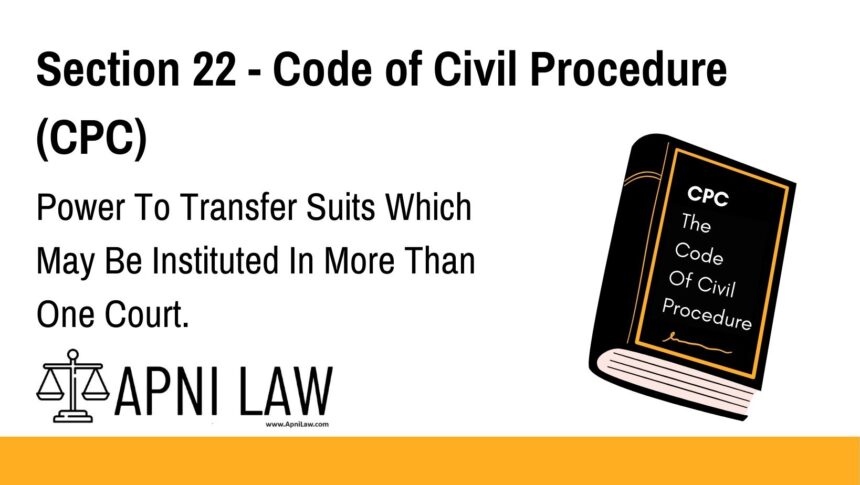CODE
Where a suit may be instituted in any one of two or more Courts and is instituted in one of such Courts, any defendant, after notice to the other parties, may, at the earliest possible opportunity and in all cases where issues are settled at or before such settlement, apply to have the suit transferred to another Court, and the Court to which such application is made, after considering the objections of the other parties (if any), shall determine in which of the several Courts having jurisdiction the suit shall proceed.
EXPLANATION
Section 22 CPC gives a defendant the right to seek a transfer of a suit when the suit could have been instituted in any one of multiple competent courts.
If a plaintiff files the suit in one such court, the defendant may, after proper notice to other parties and before settlement of issues, request a transfer to another court among those having jurisdiction. The purpose is to balance convenience and fairness between the parties while avoiding forum shopping by plaintiffs.
This provision ensures that when multiple courts are competent to try the case, the final decision on venue can be made by the court that receives the transfer application, considering the objections raised by other parties.
The application must be made at the earliest opportunity and not after the settlement of issues unless exceptional circumstances justify the delay.
ILLUSTRATION
Suppose A wants to sue B for breach of contract. The contract was signed in Mumbai, but B resides in Pune, and the cause of action partly arose in both places. As per CPC, the suit can be filed in either Mumbai or Pune.
If A files the suit in Mumbai, B may apply under Section 22 to transfer the suit to Pune, provided B makes the application before the issues are framed and after giving notice to A. The court hearing the transfer request will evaluate both sides’ positions and then decide whether the case should remain in Mumbai or be transferred to Pune.
COMMON QUESTIONS ASKED
Q1. Who can apply for a transfer under Section 22 CPC?
Only the defendant can apply for a transfer under this section.
Q2. When should the transfer application be made?
At the earliest possible opportunity and, in any case, before the settlement of issues.
Q3. Does the defendant need to notify other parties?
Yes. Notice to the other parties is mandatory before filing the application for transfer.
Q4. What factors does the Court consider while deciding the transfer application?
The Court considers the convenience of both parties, balance of hardship, interests of justice, and any objections raised by other parties.
Q5. Can the plaintiff also apply for transfer under this section?
No. Section 22 applies only to defendants. Plaintiffs may seek transfer under other provisions, such as Section 24 CPC








